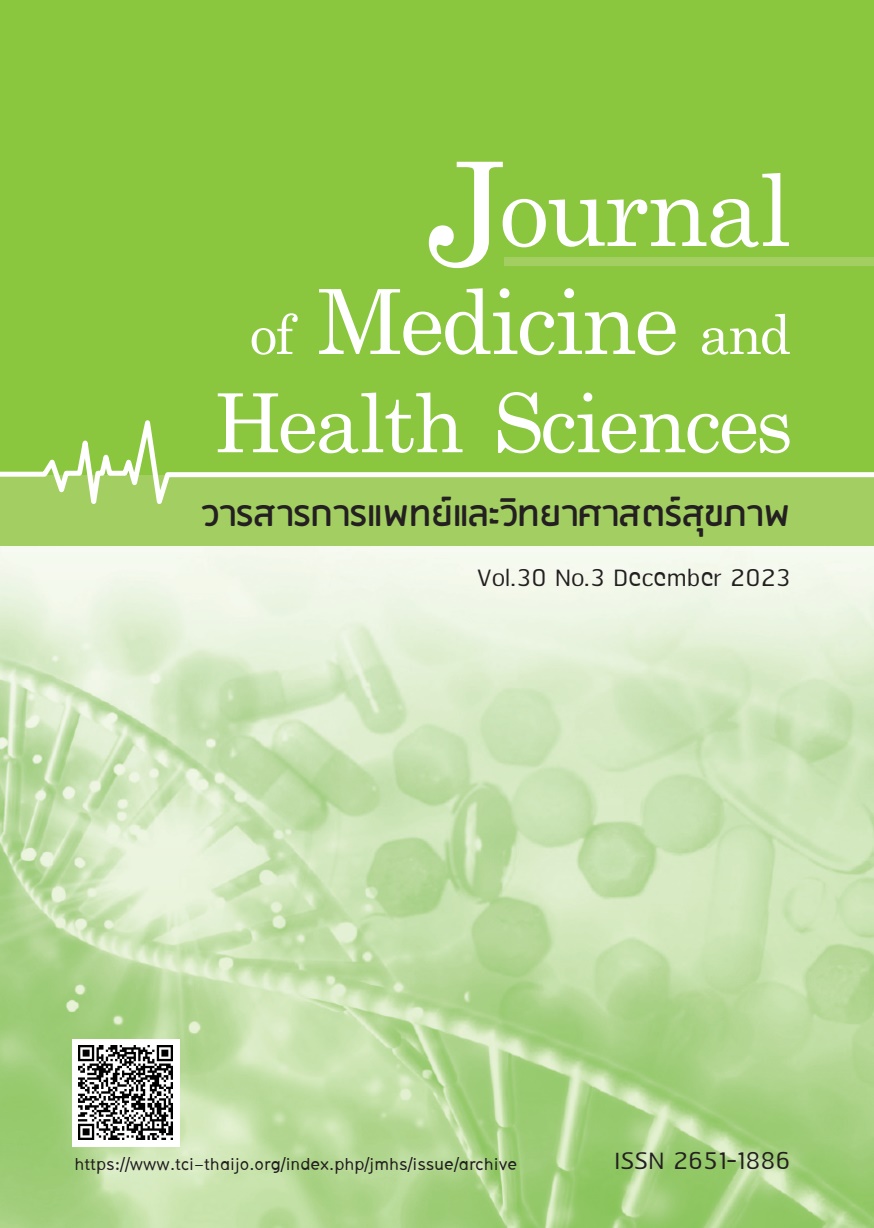ผลของโปรแกรมการสร้างเสริมการรับรู้สมรรถนะตนเอง ความรู้เกี่ยวกับโรคและแรงสนับสนุนทางสังคมต่อความรู้ พฤติกรรมการดูแลตนเอง และระดับความดันโลหิตในผู้สูงอายุโรคความดันโลหิตสูงที่ควบคุมไม่ได้
คำสำคัญ:
ความดันโลหิตสูงที่ควบคุมไม่ได้, การสร้างเสริมการรับรู้สมรรถนะตนเอง, ความรู้เกี่ยวกับโรค, แรงสนับสนุนทางสังคม, พฤติกรรมการดูแลตนเองบทคัดย่อ
ปัญหาของผู้สูงอายุที่ป่วยด้วยโรคเรื้อรัง โดยเฉพาะผู้ที่มีความดันโลหิตสูงที่ควบคุมไม่ได้เป็นปัญหาสาธารณสุขที่สำคัญของประเทศไทย การศึกษานี้มีวัตถุประสงค์เพื่อศึกษาผลของโปรแกรมการสร้างเสริมการรับรู้สมรรถนะตนเอง ความรู้เกี่ยวกับโรค และแรงสนับสนุนทางสังคม ต่อความรู้ พฤติกรรมการดูแลตนเอง และระดับความดันโลหิต ในผู้สูงอายุโรคความดันโลหิตสูงที่ควบคุมไม่ได้ รูปแบบการวิจัยเป็นการวิจัยแบบกึ่งทดลอง (quasi – experimental research) เปรียบเทียบสองกลุ่มก่อนและหลังการทดลอง (two groups pre-posttest design) กลุ่มตัวอย่างเป็นผู้สูงอายุที่มีความดันโลหิตสูงที่ควบคุมไม่ได้ มาตรวจรักษาในคลินิกโรคเรื้อรัง ณ โรงพยาบาลส่งเสริมสุขภาพตำบลบ้านลาดช้าง จังหวัดนครนายก จำนวน 60 คน ถูกแบ่งกลุ่มด้วยวิธีสุ่มอย่างง่ายออกเป็นกลุ่มทดลองและกลุ่มควบคุม กลุ่มละ 30 คน กลุ่มควบคุมได้รับการดูแลรักษาตามปกติโดยพยาบาลและแพทย์เป็นรายบุคคล กลุ่มทดลองจะได้เข้าร่วมโปรแกรมการสร้างเสริมการรับรู้สมรรถนะตนเอง ความรู้เกี่ยวกับโรค และแรงสนับสนุนทางสังคม นาน 12 สัปดาห์ ประกอบด้วย การให้ความรู้เกี่ยวกับโรคความดันโลหิตสูง การรับประทานยาลดความดันโลหิต ฝึกปฏิบัติอ่านฉลากยาและฉลากโภชนาการ เลือกเมนูอาหารแลกเปลี่ยนเรียนรู้ปัญหาการใช้ยาและการปฏิบัติตัวกับผู้สูงอายุที่มีประสบการณ์ ฝึกออกกำลังกายและทักษะการจัดการความเครียด การแก้ไขปัญหาและร่วมกันตั้งเป้าหมาย และมอบสื่อวิดีทัศน์สรุปการเรียนรู้และการปฏิบัติตัวให้ผู้สูงอายุและญาติผ่านแอพลิเคชั่นไลน์ มีการประเมินความรู้ พฤติกรรมการดูแลตนเอง ทั้งก่อนและหลังเข้าร่วมโปรแกรมฯ สัปดาห์ที่ 12 และ 16 ทั้งสองกลุ่มด้วยแบบสอบถาม และวัดความดันโลหิต วิเคราะห์ข้อมูลโดยใช้สถิติ Chi-square, Fisher’s exact test, t-test and One way repeated measured ANOVA ผลการวิจัยพบว่า (1) หลังเข้าร่วมโปรแกรมฯ ผู้สูงอายุโรคความดันโลหิตสูงที่ควบคุมไม่ได้ กลุ่มทดลองมีคะแนนเฉลี่ยความรู้เกี่ยวกับโรคสูงกว่ากลุ่มควบคุมอย่างมีนัยสำคัญทางสถิติ (p<0.001) (2) หลังเข้าร่วมโปรแกรมสัปดาห์ที่ 12 และ 16 ผู้สูงอายุโรคความดันโลหิตสูงที่ควบคุมไม่ได้ กลุ่มทดลองมีคะแนนพฤติกรรมการดูแลตนเองสูงกว่ากลุ่มควบคุมอย่างมีนัยสำคัญทางสถิติ (p=0.041, p=0.002 ตามลำดับ) (3) หลังเข้าร่วมโปรแกรมสัปดาห์ที่ 12 และ 16 ผู้สูงอายุโรคความดันโลหิตสูงที่ควบคุมไม่ได้ กลุ่มทดลองมีระดับความดันโลหิตซีสโตลิคเฉลี่ยต่ำกว่ากลุ่มควบคุมอย่างมีนัยสำคัญทางสถิติ (p=0.040, p=0.041 ตามลำดับ) โดยสรุป การศึกษานี้แสดงให้เห็นว่า โปรแกรมการสร้างเสริมการรับรู้สมรรถนะตนเอง ความรู้เกี่ยวกับโรค และแรงสนับสนุนทางสังคมช่วยให้ผู้สูงอายุโรคความดันโลหิตสูงที่ควบคุมไม่ได้ เพิ่มความรู้เกี่ยวกับโรค ปรับเปลี่ยนพฤติกรรมการดูแลตนเองให้เหมาะสม และมีระดับความดันโลหิตลดลง
เอกสารอ้างอิง
World Health Organization. Hypertension report 2021 (cited in 2021, May 19). Available from https://www.who.int/news-room/fact-sheets/detail/hypertension.
Department of Disease Control. NonCommunicable Disease situational report: diabetes, hypertension and relating factors 2019 (Internet). Bangkok: Aksorn graphic and design publishing (cited in 2023, July 27). Available from http://www.thaincd.com/document/file/download/knowledge/NCDs63update.pdf. [in Thai]
Thai Hypertension Society. 2019 Thai guidelines on the treatment of hypertension (Internet). Chiang Mai: trickthink (cited in 2023, July 27). Available from http://www.thaihypertension.org/files/442.HT%20guideline%202019.with%20watermark.pdf.
Sinsap N, Jankra J. Hypertension in the elderly: Silence killer should be aware. JPNC 2017;28:100-11. [in Thai]
Thamnamsin K, Amnatsatsue K, Kerdmongkol P, et al. Effects of self-care promoting program on self-care behavior among older adults with uncontrolled hypertension in Bangkok metropolitan. J Public Health Nurs 2015;29:43-55. [in Thai]
Raji YR, Abiona T, Gureje O. Awareness of hypertension and its impact on blood pressure control among elderly Nigerians: report from The Ibadan study of aging. PAMJ 2017;27:190. [in Thai]
Panthonglang W, Namphonkrang P, Duangsanjan W. Factors Influencing the health behavior of uncontrolled hypertension patients. Songklanagarind J Nurs 2018;38:152-65. [in Thai]
Nawsuwan K, Singhasem P, Yimyearn Y, et al. Relationship and the predictive power of social support on the practice of hypertensive patients. BCNUT J Nurs 2016;8:1-12. [in Thai]
Tan FC, Oka P, Dambha-Miller H, et al. The association between self-efficacy and self-care in essential hypertension: A systematic review. BMC Fam Pract 2021;22:1-12.
Bandura A. Self-efficacy: Toward a unifying theory of behavioral change. Psychol Rev 1977;84:191-215.
Ranee S, Kepun A. Eating pattern in Muslim patients with coronary heart disease. J Nutr Assoc Thailand 2019;54:94-106. [in Thai]
Thatsaeng B, Lasuka D, Khampolsir T. Effects of a self-management supporting program on self-management behaviors and blood pressure. Nurs J 2012;39:129-39. [in Thai]
Srisatidnarakul B. The methodology in nursing research. 5th ed. Bangkok: U & I intermedia; 2010.
Polit DF, Beck CT. Nursing Research: Generating and assessing evidence for nursing practice. 10th ed. Philadelphia: Wolters Kluwer Health; 2017.
Intarasombat P, Sirapo-ngam Y, Chansirikarn S, et al. Effects of patients’ and families’ participation in health care on function outcomes, well-being, complications, length of stay in elderly patients and patients’ and family satisfaction with care. Rama Nurs J 1996;2:4-15. [in Thai]
Jitapunkul S. Principles of geriatric medicine. 3rd ed. Division of Geriatric Medicine. Faculty of Medicine, Chulalongkorn University. Bangkok.
Aroonsang P. Health assessment in adult and older adults for nurses. 2nd ed. Khonkhaen: Klunnana vitthaya press; 2013.
Onsrinoi N, Leelukkanaveera Y, Toonsiri C. Predictive factors of hypertension preventive behaviors among people with pre-hypertension. Songklanagarind J Nurs 2017;37:63-74. [in Thai]
Pender NJ, Murdaugh CL, Parsons MA. Health promotion in nursing practice. 6th ed. New Jersey: Pearson Education; 2011.
Mersal FA, Mersal MA. Effect of evidence-based lifestyle guideline on self-efficacy of patients with hypertension. Int J Curr Microbiol App Sci 2015;4:244-63.
Wankaew N, Burilert O, Cheusathuchon. The Effectiveness of Behavior Modification with 3 Self Health and Social Support on Health Behaviors of Hypertensive Patients, the 50 Pansa Mahavajiralongkorn Hospital. UBRU J Public Health Res 2019;8:98-110. [in Thai]
Boonyathee S, Seangpraw K, OngArtborirak P, et al. Effects of a social support family caregiver training program on changing blood pressure and lipid levels among elderly at risk of hypertension in a northern Thai community. PLoS ONE 2021;16:e0259697.
Foroumandi E, Kheirouri S, Alizadeh M. The potency of education programs for management of blood pressure through increasing self-efficacy of hypertensive patients: A systematic review and meta-analysis. Patient Educ Couns 2021;103:451-61.
Santiprasitkul S, Junlapeeya P. Effects of self-efficacy enhancement program on health outcomes of people living with hypertension residing in Chiang Rai province, Thailand. J Nur Healthcare 2017;35:100-9.
ดาวน์โหลด
เผยแพร่แล้ว
รูปแบบการอ้างอิง
ฉบับ
ประเภทบทความ
สัญญาอนุญาต

อนุญาตภายใต้เงื่อนไข Creative Commons Attribution-NonCommercial-NoDerivatives 4.0 International License.



